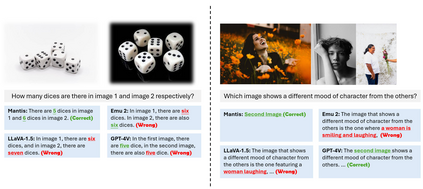The recent years have witnessed a great array of large multimodal models (LMMs) to effectively solve single-image vision language tasks. However, their abilities to solve multi-image visual language tasks is yet to be improved. The existing multi-image LMMs (e.g. OpenFlamingo, Emu, Idefics, etc) mostly gain their multi-image ability through pre-training on hundreds of millions of noisy interleaved image-text data from web, which is neither efficient nor effective. In this paper, we aim at building strong multi-image LMMs via instruction tuning with academic-level resources. Therefore, we meticulously construct Mantis-Instruct containing 721K instances from 14 multi-image datasets. We design Mantis-Instruct to cover different multi-image skills like co-reference, reasoning, comparing, temporal understanding. We combine Mantis-Instruct with several single-image visual-language datasets to train our model Mantis to handle any interleaved image-text inputs. We evaluate the trained Mantis on five multi-image benchmarks and eight single-image benchmarks. Though only requiring academic-level resources (i.e. 36 hours on 16xA100-40G), Mantis-8B can achieve state-of-the-art performance on all the multi-image benchmarks and beats the existing best multi-image LMM Idefics2-8B by an average of 9 absolute points. We observe that Mantis performs equivalently well on the held-in and held-out evaluation benchmarks. We further evaluate Mantis on single-image benchmarks and demonstrate that Mantis can maintain a strong single-image performance on par with CogVLM and Emu2. Our results are particularly encouraging as it shows that low-cost instruction tuning is indeed much more effective than intensive pre-training in terms of building multi-image LMMs.
翻译:暂无翻译

























